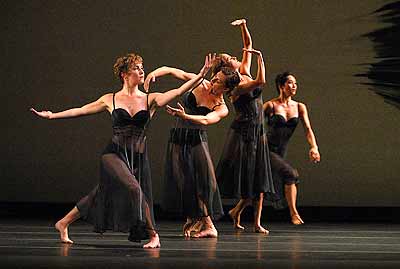
So I went to see Mozart Dances at Lincoln Center yesterday. Just barely made it on time. The thing is, while I don't mind going to things alone--I do it all the time and even enjoy it--I refuse to go to things alone while looking like something the cat dragged in. Not that my cats drag anything in, since it's not exactly safe to have outdoor cats in Manhattan, but you get the point. Anyway, I was looking rather conspicuously shabby yesterday evening, and decided I needed to shower which almost made me late. But I wasn't. Which was good since me tickets were, of course, in the fourth tier so I had a lot of stairs to climb once I got there.
Anyway, I was feeling rather good about seeing this because I'd read the Joan Acocella article in the New Yorker in which she wrote of Mark Morris:
Why is he so popular? One reason, I think, is that he gives people the modern pleasure of seeing abstract work without leaving them scratching their heads over what it was about. Though he may not have a story on the surface, he always has one underneath, in the form of movement motifs.I read that and though, well that sounds accessible. And accessible is totally what I need when it comes to dance, since if it's not easy to follow I'm completely lost. I'd also read about how musical his choreography is and I figured that would help me as well.
And as is turned out I enjoyed it very much. I don't have the proper vocabulary to describe what I saw--which is ok, because in New York at least, it's showing on PBS again on Sunday so check your listings and see it yourself--but the way that the dancers moved just seemed to be right. It seemed like the movement was the only possible movement, and even when the motions were unnatural, they didn't look contrived. And the repetition, the "movement motifs" Acocella refers to, were mixed with moments that were delightfully surprising.

The kind of inevitable feeling to the dance seemed to match Mozart's music which always seems to me to have come into the world fully formed, as if each note can only be that which it is. And this quality seems to connect with all the Millay I've been reading as well. In her best poetry, the words just seem to have fallen into place. None of these three things--the dance, the music, the poetry--are natural. The succession of notes Mozart puts together aren't natural, nor is the movement Morris choreographs, nor is Millay's diction. So it seems to me a great triumph to make them feel as though they are.
No comments:
Post a Comment